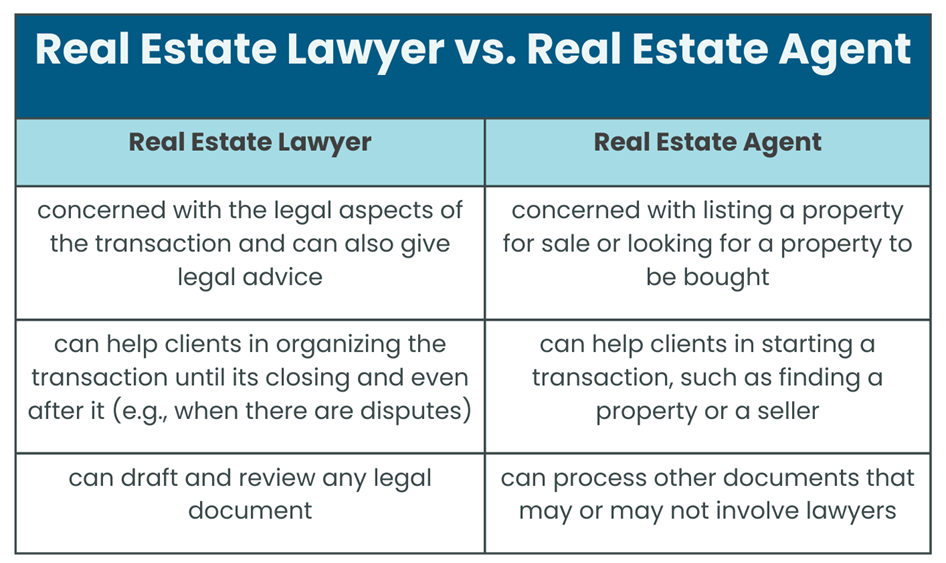
Know what a real estate lawyer does. Let a competent real estate lawyer be your guide in making major property transactions

If you’re a first-time home buyer or looking for your second or third property, hiring a competent real estate lawyer can be helpful. With their knowledge of the complicated Canadian real estate market, they can guide you with your legal transactions, documents, and insurance. Whether you’re a buyer or a seller, they can make sure your real estate deal is solid and that it doesn’t fall flat.
This article can be used by future and current homeowners who are interested to know what a real estate lawyer does. This can also be used by lawyers to educate their clients about their roles when working in real estate.
A real estate lawyer helps their clients with the different (and mostly difficult) stages of buying or selling property. The property in question can either be residential houses or commercial properties.
A real estate lawyer can also ensure that the rights of their clients are protected in the transaction, as laid out in the contract and other legal documents.
Here are some of the general ways that a real estate lawyer can help you:
What does a real estate lawyer in Ontario do? Watch this video to find out:
When looking for the best real estate lawyer in your area, check out Canadian Lawyer’s Special Report on the Top 10 Ontario Regional Firms to see who’s who nearby.
A competent real estate lawyer is knowledgeable and experienced when it comes to the rules and regulations of any real estate transaction. They can:
Also, a real estate lawyer can provide legal advice on the following related matters:
A real estate lawyer can also help in these areas:
Let’s go over these points in more detail:
Whether as a preventive measure or when you feel that your rights have been violated, there's no other better professional to reach out for than a real estate lawyer. But it’s important to talk to a local lawyer, since real estate laws may differ in every province and territory, including some important administrative processes. For example, doing a title search in Ontario might be different from another province or territory.
As a buyer, you want to make sure that the property you’re buying has no complications. This is part of the overall conduct of due diligence, which is where title searches come in. All these can be done by a real estate lawyer for you.
With a title search, you can:
Title insurance will protect you from any problem that may arise because of the property title and the title search done on it. This is also part of the process to ensure that the title from the seller is clean.
Getting insurance is a must when acquiring property, and your real estate lawyer can arrange your property’s title insurance for you. It is important to note that title insurance and home insurance are not the same thing.
Getting title insurance is beneficial, as it covers issues that occurred before and after you purchased your property.
Buying or selling property involves a lot of documents, and these are indispensable so that your rights are protected during the transaction. However, dealing with these legal documents does not have to be done alone; a real estate lawyer is there to assist you in any of these processes.
When it comes to agreements and contracts, a licensed real estate lawyer can:
Here's a list of some of the documents that your real estate lawyer can help you draft or review:
When going through these documents, which are usually full of legalese, your real estate lawyer can review and simplify the language for you.
Another legal document that must be completed for a transaction to push through is a pre-delivery inspection. This is also an area where a real estate lawyer can help their clients. Know more about this document with this video:
Go to Canadian Lawyer’s Rankings page for a list of other lawyers who top their own areas of expertise.
The closing date is the final step in your property transaction. This is when the ownership of the property is officially transferred to the buyer. It is dubbed as the most important event in a sale transaction.
On closing day, your real estate lawyer can facilitate your financial transactions. You’ll also take the time to finalize the transaction, where they’ll create a Statement of Adjustments. This document shows the details of the transaction, including:
If you’re purchasing a resale property, the keys will be delivered to your lawyer’s office on the day of closing. They won’t be released until the closing has been completed. In other words, a lawyer can hold payment and other closing documents in escrow until the transaction has been closed.
In addition, your real estate lawyer can help you familiarize and prepare for some of the hidden costs when buying a home in Canada. After this, there will be no surprises when it comes to expenses on the closing day itself.
Lastly, registering the transfer of the property can be done by the lawyer on your behalf. This is done with the Ontario Land Registry Office and using their electronic land registration systems, which lawyers can also access.
Most real estate deals would involve mortgages over the subject property. If your transaction is one of these, then having a lawyer by your side would be prudent. Don’t think of lawyers as important only when the foreclosure proceedings are rolling out, because they can also guide you from day 1 or when you’re still getting a mortgage. They can also act as an intermediary between you and your mortgage lender, such as your bank or other financial institution.
When things do not go smoothly, a foreclosure proceeding may be filed against you as a homeowner. On the flipside, you may need to file one to enforce your property rights as a financer. Either way, you’ll need the help of a real estate lawyer.
Court procedures regarding the process of property foreclosures vary from province and/or territory. It’s best to hire a real estate lawyer to help you handle this.
Your lawyer will help you navigate this tricky situation and will give you legal advice regarding your different options. If you’re the homeowner, they may help you modify your loan and may come up with several defenses that your party can raise in court.
While there may be some situations when you may not need the services of a lawyer to handle your foreclosure, it’s better to know what to expect when facing foreclosure.
When transactions turn sour, a real estate lawyer can provide legal advice and represent you in court, whether as plaintiff or defendant. Aside from this, lawyers also offer legal advice on property disputes and other legal issues such as encroachment, trespassing, and injuries.
In a real estate litigation, your real estate lawyer can:
They will also negotiate with the opposing counsel to work out a possible settlement agreement, whenever allowed by the law and depending on the issue involved.
Disputes can be resolved without going to court, which real estate lawyers can also help you with. For example, if the property is appraised at a value lower than the agreed offer, parties to the transaction can negotiate through their own lawyers.
Real estate agents and lawyers can both offer beneficial yet completely different services when it comes to an upcoming major property transaction. Both agents and lawyers are regulated professionals whom you can trust when dealing with real estate. Both agent and lawyer can make the complex process of buying or selling a home easier for you.
There are some differences when it comes to what they can do for you. Here are the roles of a real estate agent:
The roles of real estate agents differ depending on your province.
In sum, here’s a difference between real estate lawyers and real estate agents:

Investing in real estate is a big step. This is why having a competent real estate lawyer is important; you can be sure that your rights are protected, and that your property transaction is legally sound. So, before you sign on any dotted line, make sure you’ve got the right legal support by hiring the best real estate lawyer.
To know more about what a real estate lawyer does, head over to our Real Estate practice area for more resources and industry updates.